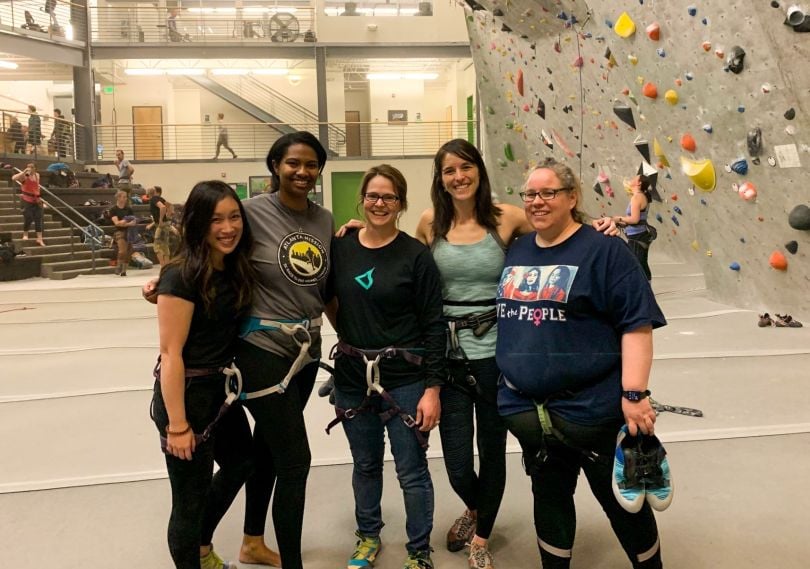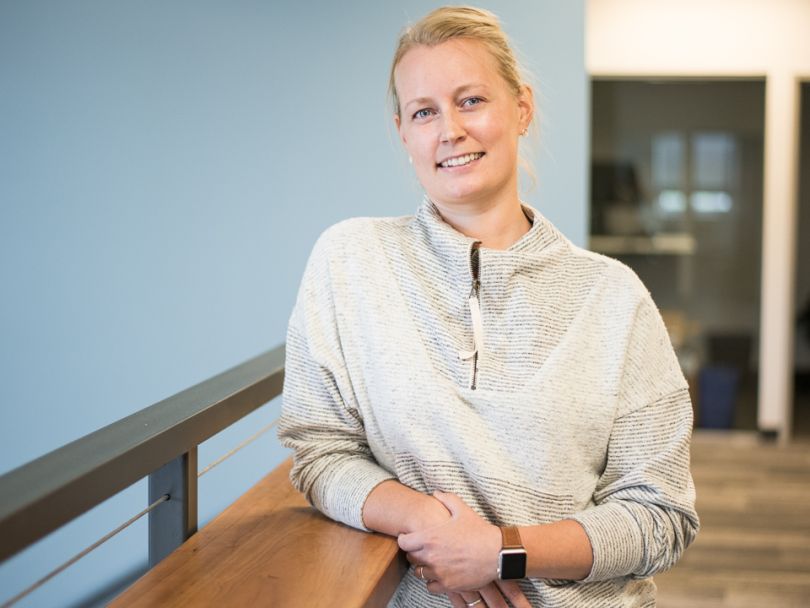
Even the highest court in the country isn’t immune to the gender perceptions that shape how many Americans grew up and, consequently, relate to one another at work. In the fall of 2017, two Northwestern law students published research citing the fact that even though women made up less than a quarter of the judges on the Supreme Court, they were interrupted about 32 percent of the time. But those same women were only responsible for about 4 percent of the interruptions.
When local Engineering Manager Tiana Newbauer-Hampton sees the issue play out in her corporate environment, she says that a simple “let me finish my thought” usually does the trick.
Newbauer-Hampton and the following four Colorado tech professionals have been or currently are the only women on a team of men. And while being the odd one out in any situation can feel alienating, the circumstances have given them the power to address subtle biases and male-dominated team dynamics head on.
“If you feel inadequate, don’t,” Motion Planning and Controls Engineer Tessa Ronan said. “If someone is talking over you or taking control of something you own, then let them know.”

VP of People and Culture Nichole Sterling understands that gender dynamics in the workplace are a result of both upbringing and environment. She said that when men build consensus, they are often seen as collaborators. But women in the same situation may be perceived as needing to lean on others to make a decision.
It’s a paradox she and her colleagues, including Engineering Manager Tiana Newbauer-Hampton, tackle head on at Stateless by teaching their teammates about differences in gender perception. Newbauer-Hampton urges her peers to not let negatively impacting behavior go without being addressed, no matter how difficult doing so in the moment might be.
What is the greatest challenge you’ve experienced being the only woman on a team? What did you do to overcome that challenge?
Sterling: Feeling like you have to continually prove yourself and struggling to feel heard. These subtle forms of bias are not only something I’ve had to deal with personally; almost every woman I’ve spoken to has a similar story. Figuring out how to navigate the male-dominated team dynamics to change these ingrained behaviors is the greatest challenge I’ve experienced. It requires finding the strength to address potentially harmful behaviors directly to ultimately create a better team environment for everyone.
At Stateless, we have a women’s group that meets monthly to discuss topics like this openly. We check in and offer support to the other women in the company who we might not see daily. We came up with a few different ways we’ve each learned to overcome these challenges.
If we know a particularly difficult person will be in the room, we try to build consensus with other colleagues before going into a meeting. Some people simply need to hear what you have to say multiple times and from other people, and that’s OK. If an individual seems resistant to your ideas, follow up with them one on one after the meeting. Having a personal conversation separately allows you to break through specific barriers that might come up in a group setting.
What’s the most important lesson you learned from being the only woman on a team, and how have you continued to apply that lesson in your professional and personal life?
Newbauer-Hampton: As a byproduct of our experiences, we all perceive situations differently. Learning how to share your own intuition and insight is powerful when diverse perspectives are needed (which is always!). The most important lesson I’ve learned from working on all-male teams is realizing your voice is valuable and essential to making better decisions.
There are times where I’ve had to assert my presence even though it was uncomfortable and sometimes met with resistance. In these situations, I remind myself that people in the room cannot read my mind. Through this exercise, I’ve developed even greater confidence in my abilities. It has become easier to have that voice in the room as time goes on.
Also, studies show women allow themselves to be interrupted when they do speak up. So don’t be afraid to say “Let me finish my thought” to a colleague.
Spend time outside of work defining your self-worth and understanding your value.’’
What’s the best piece of advice you’d offer to other women working on male-dominated teams?
Newbauer-Hampton: At Stateless, we talk a lot about the dignity model created by Donna Hicks. And when we come across a conflict or issue, we tend to bring it back to this model. Hicks has defined dignity as “the glue that holds all of our relationships together.” Dignity, in this model, is inherent –– it is our value and our self-worth.
Spend time outside of work defining your self-worth and understanding your value. Tackling issues head-on, even when it is not comfortable, will help you continually build your confidence so that you can draw on inner strength when you’re put into difficult situations.
When a difficult situation arises, I try to remind myself of one of the lessons from the dignity model: “My value is my value. It’s intrinsic and there’s no threat to that.” This helps ground me so I don’t overreact and I can look for ways to address the behavior with that specific person in a way that honors my own and the other person’s dignity, versus reacting to that initial fight-or-flight impulse.

At Outrider, Tessa Ronan isn’t afraid to ask questions to get the context she needs to develop embedded and controls software for the logistic company’s hardware system. But that wasn’t always the case. She said in previous roles she has been talked down to, which ultimately, affected the way she did her job.
What is the greatest challenge you’ve experienced being the only woman on a team? What did you do to overcome that challenge?
As a fresh graduate, I worked on a project with a senior lead engineer who would not explain anything too technical to me. If I was stuck on a problem, I asked him to give me some background about how it worked. He brushed me off, saying it was “too complicated,” yet he willingly explained things to my male counterparts.
By not helping me learn, the project dragged on for weeks as I tried to understand the code on my own. I learned to dig deep into the material and teach myself. I ended up learning a lot more than I would have otherwise.
In contrast, today at Outrider, I ask a lot of questions and get a lot of answers. Our engineering team fosters curiosity by making it a safe and welcoming place to ask questions — as many as you might have to get the context needed to do terrific work.
What’s the most important lesson you learned from being the only woman on a team, and how have you continued to apply that lesson in your professional and personal life?
As a student, I knew the statistics: the low ratio of women to men in STEM jobs, the gender pay gap and the lack of women in high-earning positions. When I took my first job out of college, I found it very difficult to distinguish whether a situation occurred because I was a new graduate or because I was a woman. But it doesn’t matter which one of those factors played a role. You shouldn’t sit back and allow it.
When I was told “it’s too complicated,” I should have told my manager why the project was dragging and asked for help on how to overcome it. Instead of rummaging through outdated materials to figure it out on my own, taking this step would have kept the project on track. Today, I take action as soon as I notice that something is not right. I feel empowered to speak up, especially knowing that my voice will be heard.
If you feel inadequate, don’t.’’
What’s the best piece of advice you’d offer to other women working on male-dominated teams?
If you feel inadequate, don’t. If someone is talking over you or taking control of something you own, then let them know. Don’t take things personally. Try to look for companies that embrace diversity and inclusion as well as training and career growth for their employees.

Whether she’s decorating a cake or assembling a robot, Maria Van Dyke tries to be humbly confident and respectful. At AMP, the production team lead said she and her male colleagues are often able to identify different solutions to the same problem. But that’s just the beginning. The key to communal growth lies in combining perspectives.
What is the greatest challenge you’ve experienced being the only woman on a team? What did you do to overcome that challenge?
The greatest challenge I’ve experienced actually has less to do with being the only woman on my team and more to do with the type of work I took on when I joined AMP. The transition between cake decorating and the world of manufacturing was no small feat. There were so many tools, terms and other topics to learn. While I was exposed to some of them before, it was a different challenge to ingest and understand them all at the level I needed to in order to do my job. Cake decorating and robots both involve “assembly,” but the components are like night and day. I dealt with the challenge by asking lots of questions. I’ve been lucky to have a number of wonderful mentors at AMP who have helped me acclimate and thrive.
What’s the most important lesson you learned from being the only woman on a team, and how have you continued to apply that lesson in your professional and personal life?
The most important lesson I’ve learned from being the only woman on my team is the value of diverse perspectives. Men and women may look at situations and problem-solve differently, but I value my male teammates’ input just as much as they value mine.
We combine our perspectives to strengthen our collective approach to challenges, which opens the door to better, more creative ideas. I may identify details that my male colleagues miss entirely, whereas they may formulate solutions I never would have without the same viewpoint or previous experience.
We combine our perspectives to strengthen our collective approach to challenges.’’
What’s the best piece of advice you’d offer to other women working on male-dominated teams?
The best piece of advice I’d offer to other women working in a male-dominated environment is to be humbly confident and respectful. Recognize you have a lot to offer yet also a lot to potentially learn. And be open to how and from whom you can learn, as well as how and whom you can teach.
Man or woman, whether you’re new or experienced to a field, leading with respect for everyone’s perspectives opens up so many different ways we can unify them for the benefit of ourselves, our teams and the customers we serve. Prioritizing how our differences make us stronger, instead of how they divide us, is a powerful mindset shift and a reminder that as one team, we can do anything.

At big data company Alteryx, Laurie Linz is constantly on the lookout for anyone who might be unknowingly holding themselves back. The software development test engineer said that part of overcoming a hesitancy to speak out in meetings involves taking more calculated risks –– often, with the support of peers and mentors.
What is the greatest challenge you’ve experienced being the only woman on a team? What did you do to overcome that challenge?
My biggest challenge is being afraid to speak out, even when I feel very confident on the subject matter. I think everyone (man or woman) is familiar with the scenario of being overshadowed in a meeting by someone with the same idea but a louder voice. When you are the only woman on a team, I believe this happens more often. But whether or not that’s the case, the perception alone can hold you back. The only solution is to take risks. Be the person to speak out.
What’s the most important lesson you learned from being the only woman on a team, and how have you continued to apply that lesson in your professional and personal life?
We have to look out for each other. Don’t simply look out for other women. Look out for anyone who may be holding themselves back for any number of reasons. Being the only woman on a team is an interesting dynamic. It is a privileged position but one no one really wants. No one wants to be “the only” anything. So we need to lift others up, support each other when we can and help others who may not be in a position to stand up for themselves.
When someone stands up for you either publicly or privately, let them know how much you appreciate it.
You were hired because you are capable.’’
What’s the best piece of advice you’d offer to other women working on male-dominated teams?
Sometimes you need to get out of your head. Stop thinking and just do what you are there to do. You were hired because you are capable. Dig in and get out of your own way.














